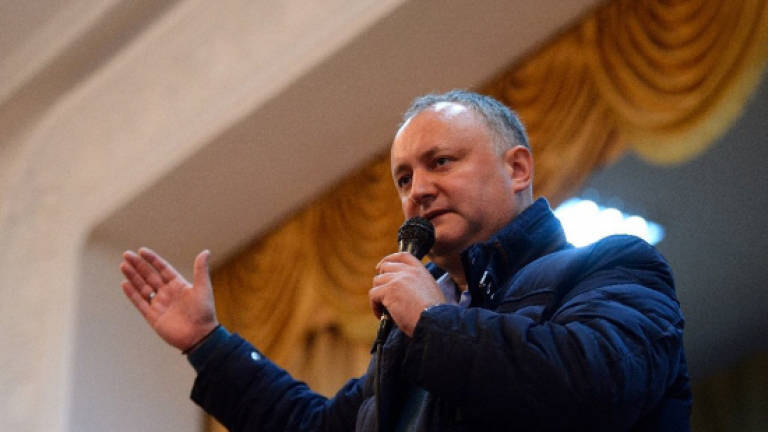Moldova votes in first presidential polls in two decades

CHISINAU: Ex-Soviet Moldova went to the polls Sunday in its first popular presidential election since the 1990s, seen as a tug-of-war between supporters of closer relations with Russia and those seeking EU integration.
The crisis-hit country of 3.5 million wedged between Ukraine and Romania is the poorest in Europe and has struggled with a string of high-profile corruption scandals which are overshadowing the vote.
Presidential candidates are presenting diametrically opposed visions for the country's future: calling for deeper ties and boosting trade with Moscow, or committing to the path toward Europe.
Voting commenced at 7am (1pm Malaysia) at the nearly 2,000 polling stations across the country.
Moldova has been rocked by protests and political turmoil since the mysterious disappearance of US$1 billion (RM4 billion) from three banks last year, which undermined people's support for the ruling pro-Western coalition.
Western observers monitoring the campaign said in September that Moldovans lack confidence in state authorities after the bank scandal, which led to the suspension of EU aid that risks plunging the country into even deeper poverty.
Already 41% of the population live on less than US$5 a day while the monthly average salary is US$240, according to World Bank figures.
Moldova last elected a president by popular vote in 1996, after which members of parliament chose the head of state.
It was the pro-Western coalition that earlier this year reestablished the popular vote, but pro-Moscow candidate Igor Dodon of the Socialist Party, who has been ahead in opinion polls, has pledged to push for new parliamentary elections.
The central election commission in Moldova said the presidential vote will be heavily monitored by over 3,200 Moldovan observers and 562 international ones.
East-West divide
Dodon is one of nine candidates remaining on the ballot.
The leading pro-Western contender for the post is Maya Sandu, from the centre-right opposition, who received a boost when ruling party candidate Marian Lupu withdrew on Wednesday, endorsing her.
Sandu, a former education minister who worked for the World Bank, told AFP ahead of the polls that authorities in Chisinau would have to work hard to earn back people's trust.
"We advocate European integration because we see true democracy and prosperity for workers in the EU," Sandu told AFP.
Dodon told AFP that while he is "not against the EU", there has simply not been enough support from Europe to convince Moldovans the future would be brighter there.
"What have we received from Europe? Nothing," said Dodon, who served as economy minister from 2006 to 2009, vowing to "restore a strategic partnership with Russia".
Russia has been historically a reliable export market for Moldova's agriculture, while remittances from Moldovans working there made up a considerable part of the economy, though it has taken a hit with Moscow's own recession.
EU officials have admitted that Europe has lost much of its appeal in the ex-Soviet republic in spite of the historic EU association agreement signed in 2014, as no successful reforms have been seen through.
"The fact that we have had successive governments that have called themselves pro-European ... has taken a toll on the popularity of the European vector," the head of the EU mission to Moldova, Pirkka Tapiola, told AFP.
He added that the East-West rhetoric is often used to gloss over deeper and more important issues like fighting corruption and reforming discredited institutions.
"I think that some may have preferred to direct the discourse into pro-EU or pro-Russia because it is an easy discourse compared to the main discourse," he said.
Polls close at 9pm (3am Malaysia) with the first results expected around 11pm. — AFP